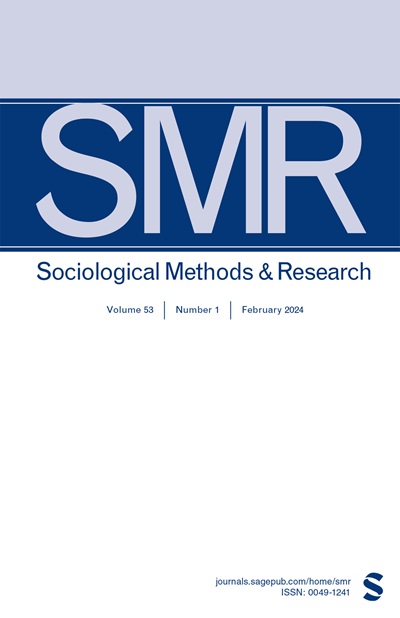利用 DAG 进行深度学习
IF 6.5
2区 社会学
Q1 SOCIAL SCIENCES, MATHEMATICAL METHODS
引用次数: 0
摘要
社会科学理论经常假设变量之间的因果关系系统,这通常用有向无环图(dag)来表示。作为非参数因果模型,dag不需要对假设关系的功能形式进行假设。然而,为了简化经验评估,研究人员通常会调用这样的假设,即使它们往往是武断的,不反映任何理论内容或先验知识。此外,只要功能形式假设不能准确地捕捉系统的真正复杂性,就会产生偏差。在本文中,我们介绍了因果图归一化流(cgnf),这是一种新的因果推理方法,它利用深度神经网络来经验地评估以dag表示的理论。与传统方法不同,cGNFs使用分析师指定的DAG对数据的完整联合分布进行建模,而不依赖于对功能形式的严格假设。这使得从DAG中识别的任何因果估计能够灵活,非参数估计,包括总影响,直接和间接影响,以及路径特定影响。我们通过重新分析Blau和Duncan(1967)的地位获得模型和Zhou(2019)的控制流动性模型来说明该方法。文章最后讨论了当前的局限性和未来的发展方向。本文章由计算机程序翻译,如有差异,请以英文原文为准。
Deep Learning With DAGs
Social science theories often postulate systems of causal relationships among variables, which are commonly represented using directed acyclic graphs (DAGs). As non-parametric causal models, DAGs require no assumptions about the functional form of the hypothesized relationships. Nevertheless, to simplify empirical evaluation, researchers typically invoke such assumptions anyway, even though they are often arbitrary and do not reflect any theoretical content or prior knowledge. Moreover, functional form assumptions can engender bias, whenever they fail to accurately capture the true complexity of the system. In this article, we introduce causal-graphical normalizing flows (cGNFs), a novel approach to causal inference that leverages deep neural networks to empirically evaluate theories represented as DAGs. Unlike conventional methods, cGNFs model the full joint distribution of the data using a DAG specified by the analyst, without relying on stringent assumptions about functional form. This enables flexible, non-parametric estimation of any causal estimand identified from the DAG, including total effects, direct and indirect effects, and path-specific effects. We illustrate the method with a reanalysis of Blau and Duncan’s ( 1967 ) model of status attainment and Zhou’s ( 2019 ) model of controlled mobility. The article concludes with a discussion of current limitations and directions for future development.
求助全文
通过发布文献求助,成功后即可免费获取论文全文。
去求助
来源期刊

Sociological Methods & Research
Multiple-
CiteScore
16.30
自引率
3.20%
发文量
40
期刊介绍:
Sociological Methods & Research is a quarterly journal devoted to sociology as a cumulative empirical science. The objectives of SMR are multiple, but emphasis is placed on articles that advance the understanding of the field through systematic presentations that clarify methodological problems and assist in ordering the known facts in an area. Review articles will be published, particularly those that emphasize a critical analysis of the status of the arts, but original presentations that are broadly based and provide new research will also be published. Intrinsically, SMR is viewed as substantive journal but one that is highly focused on the assessment of the scientific status of sociology. The scope is broad and flexible, and authors are invited to correspond with the editors about the appropriateness of their articles.
 求助内容:
求助内容: 应助结果提醒方式:
应助结果提醒方式:


